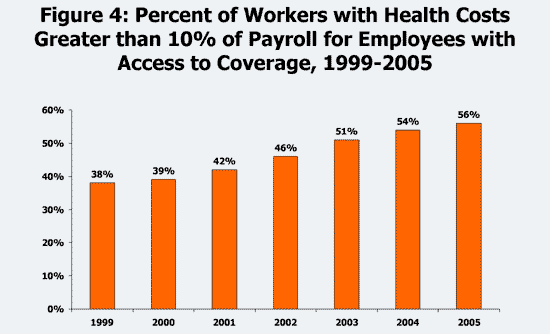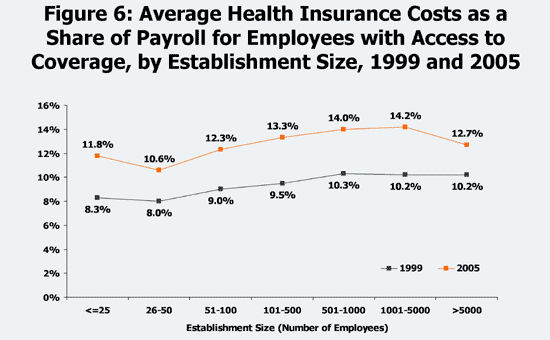Barack Obama and his fellow Democrats keep telling us that the goal is to insure those people who are currently uninsured. They tell us that their desired “government option” is only to provide an inexpensive alternative for those who can’t afford their own private policy or those whose employers do not provide health insurance. The Republicans, on the other hand, tell us that the “government option” is strictly an attempt to force everyone into government controlled health care, or socialized medicine.
Obama and his cohorts accuse the Republicans of fear mongering. They insist that if you already have health insurance that you like, then you can keep it. They also say that if your employer provides health insurance then you will be able to keep it. Their plan is to implement a payroll tax of up to 8% for companies that do not provide health insurance benefits for their employees.
This proposed 8% tax on payrolls got me thinking. I keep hearing how much health care is costing employers, and how much it continues to rise each year. I know for myself, it seems my portion of the health care premiums seems to go up each year as well. The question I had in my mind was, “How much are employers paying to provide health insurance as a percentage of payroll?”
I found a very interesting report from The Kaiser Family Foundation website that covered statistics from 1999-2005. The data they used was based on the National Compensation Survey which looks at labor costs on a quarterly basis. They looked at a number different scenarios including number of employees and types of occupations.
Here are a few of the things they discovered. Keep in mind that the last data they used was from 2005, so we can probably safely assume that the numbers are probably higher today. First, in 1999, 38% of workers with health insurance had costs greater than 10% of payroll expenses. By 2005, that number had grown to 56%.

Next, when looking at companies of varying sizes there is a wide spread in the percentage of payroll that is spent towards health insurance. In 2005, the lowest percentage was 10.6% of payroll expenses was spent towards health insurance. The highest percentage was 14.2%.

So what do these figures mean in relation to the proposed 8% payroll tax? From a strictly business point of view, I can see a couple different scenarios playing out. For companies that are currently not offering health insurance to their employees, they would be subject to the tax. Since adding health insurance would increase expenses by greater than the 8% tax, I would expect that they would not add health insurance. Also, now that their expenses would be going up, it would be reasonable to expect that they would cut expenses, most likely payroll expenses. To reduce their payroll expense by the 8% tax, the easiest way is to cut jobs. That would work out on average to losing 1 of 12 positions within a business.
The next scenario would be for companies that are currently offering health insurance. If I am a business owner who is offering health insurance, that expense is currently running 10-14% of my payroll. I could cut my expenses from 10-14% of my payroll to only 8% of my payroll by eliminating employer provided health insurance and paying the new tax. A pretty tempting proposition.
It took me less than half an hour to find this information on how much businesses are paying for health insurance for their employees. Barack Obama and his fellow Democrats are not stupid people. I would be fairly confident that they know these numbers. What better way to force businesses to stop providing health insurance to their employees, thus forcing them to the government plan, than to give business a financial incentive to do so. So I have to ask the question. Now when Barack Obama says that you can keep your employer provided health insurance, do you believe him? I don't.
![Reblog this post [with Zemanta]](http://img.zemanta.com/reblog_e.png?x-id=c490e61d-4018-4e34-aadd-0d121d5d6946)
Dickster: Good Post! Great Job!
ReplyDeleteBest, Marc Chamot
Thanks for the kind words.
ReplyDeleteFurther, by eliminating the pre-existing condition thing, an older couple (pre-medicare) could simply pay the 2.5% tax and when calamity struck, go buy a policy. When cured, drop the policy. What buffoons wrote this thing?
ReplyDeleteDickster, I'm sorry this makes no sense. If cost is all that matters in these decisions, you need no new legislation. You could cut your current healthcare bill right now from 10-14% of payroll down to 0%. Just don't offer insurance anymore. What? Your employees would resign? Well, maybe your choice to dump private insurance and instead just pay the 8% penalty would have the same result. It's not a tempting idea at all.
ReplyDelete